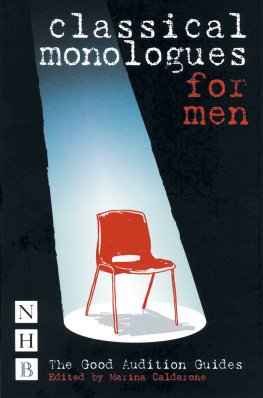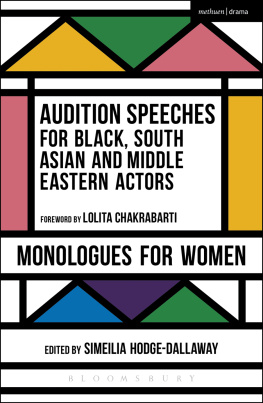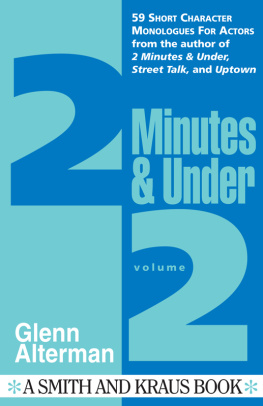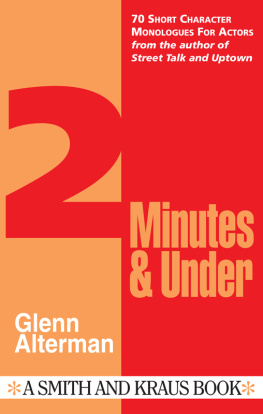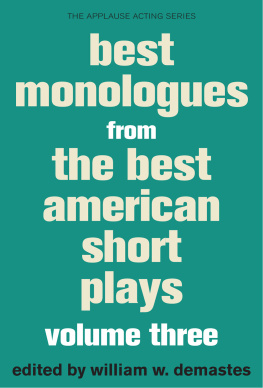THE OBERON BOOK OF
MONOLOGUES FOR BLACK ACTORS:
CLASSICAL AND CONTEMPORARY SPEECHES
FROM BLACK BRITISH PLAYS:
MONOLOGUES FOR WOMEN Volume 1
THE OBERON BOOK OF
MONOLOGUES FOR BLACK ACTORS:
CLASSICAL AND CONTEMPORARY
SPEECHES FROM BLACK BRITISH PLAYS:
MONOLOGUES FOR WOMEN Volume 1
Selected and Introduced by Simeilia Hodge-Dallaway

First published in 2013 by Oberon Books Ltd in association with Theatre
Royal Stratford East
521 Caledonian Road, London N7 9RH
Tel: 020 7607 3637 / Fax: 020 7607 3629
e-mail:
www.oberonbooks.com
Compilation copyright Simeilia Hodge-Dallaway 2013
Simeilia Hodge-Dallaway is hereby identified as author of this compilation of extracts of plays in accordance with section 77 of the Copyright, Designs and Patents Act 1988. The author has asserted her moral rights.
The contributors are hereby identified as authors of their contributions in accordance with section 77 of the Copyright, Designs and Patents Act 1988. The authors have asserted their moral rights.
All rights whatsoever in these extracts are strictly reserved and application for performance, other than in an audition context, should be made before commencement of rehearsal to the authors agents. No performance may be given unless a licence has been obtained, and no alterations may be made in the title or the text of the play without the authors prior written consent.
You may not copy, store, distribute, transmit, reproduce or otherwise make available this publication (or any part of it) in any form, or binding or by any means (print, electronic, digital, optical, mechanical, photocopying, recording or otherwise), without the prior written permission of the publisher. Any person who does any unauthorized act in relation to this publication may be liable to criminal prosecution and civil claims for damages.
A catalogue record for this book is available from the British Library.
PB ISBN: 978-1-78319-056-0
EPUB ISBN: 978-1-78319-555-8
Cover photograph by James Illman featuring Naomi Belle.
Printed and bound by Replika Press PVT Ltd., India.
Visit www.oberonbooks.com to read more about all our books and to buy them. You will also find features, author interviews and news of any author events, and you can sign up for e-newsletters so that youre always first to hear about our new releases.
We gratefully acknowledge financial assistance from the Arts Council England and The National Lottery,
The Authors Foundation and
Theatre Royal Stratford East.
Many thanks to Central School of Speech and Drama who provided the space to shoot the photograph for the front cover and Naomi Belle who appears in it.
FOREWORD
I have always believed that everything starts in the writing. But in a male-dominated industry with the lack of male writers writing from a female perspective, and the limited number of female writers failing to receive as much publicity for their work, I, like many other black female actresses, can often feel somewhat forgotten about and neglected by the industry. Finding any parts, let alone roles which offer an actress the chance to play a strong female protagonist or a role which is uncompromising, truthful and dynamic can seem impossible. I have heard countless accounts of aspiring black actresses forced to write their own parts when studying drama in schools due to the lack of accessibility of culturally diverse resource material. Many a times in frustration I have questioned, aside from the few plays that Im aware of, if there were more plays which feature a diversity of parts for actresses like me.
Through this monologue anthology Simeilia Hodge-Dallaway has opened my eyes to many plays which contain a realistic representation of what it means to be a woman today and more importantly, what it has meant to be a woman throughout the last sixty years. Its enlightening to come across a collection of speeches that enables us to see ourselves throughout the years, as we celebrate our culture, language and experiences. Its commendable that Simeilia has utilised her extensive knowledge of black plays to find some of the best speeches to feature in this monologue anthology; actresses around the world can now revel in a magnitude of parts written by Black British playwrights. At last, black actresses can feel empowered knowing that they have always had a voice in the industry, a voice which they can now use to succeed, grow and make a difference.
I hope that this volume will help actresses with auditions and showcases, and encourage practitioners to restage and create adaptations of past productions. More importantly, I hope it will inspire every generation of actors and non-actors to reconnect with the great legacy of Black British work.
Needless to say, this monologue anthology will benefit black actresses around the globe. It will also provide any reader with an insight into the many experiences of Black British women and perhaps, this book will also give more writers the incentive to write parts for women, so that Simeilia Hodge-Dallaway can continue to create many more anthologies for black women for years to come.
Naomie Harris
INTRODUCTION
How many Black British plays can you name?
I posed this question to actors, students, and teachers and saw the same embarrassed look on their faces as they struggled to name more than five plays. Their faces changed to utter dismay when I told them that after setting up and managing the Black British Play Archive at the National Theatre, I had re-discovered over 400 plays written by Black British playwrights which had been professionally performed on stage in Britain. This was the very question that inspired me to create the first collection of monologue books for Black British actors and practitioners.
Before working on the Black British Play Archive admittedly I simply lacked any knowledge of the Black British play canon, and instead I sought validation from the work of Black American writers, namely Lorraine Hansberry and Ntozake Shange. I still remember receiving my first black play For Colored Girls Who Have Considered Suicide When the Rainbow is Enuf by Ntozake Shange, given to me by Rebecca Prichard after I performed in her play Fairgame produced by the Royal Court Theatre and staged at the Duke of York Theatre, St Martins Lane. I had an overwhelming feeling of validation when reading this play. It reflected parts of my culture, language, song, history. Needless to say For Colored Girls was the first play I directed at university. I feel strongly that it is imperative for people of colour to have an awareness of work which exists and reflects their history.
After graduating from Roehampton University in 2004, I gained the opportunity to assist the direction of the production Oxford Street by Black British playwright Levi David Addai at the Royal Court Theatre (2008). I later discovered the significance of working at the Royal Court as it was the first theatre venue in London to stage and offer dramaturgical support to new plays written by Black British playwrights.
The birth of Black British theatre companies took place in the 1970s and 1980s, created by leading black actors, directors and writers who desperately wanted to provide a wider platform for their peers, other upcoming black artists and themselves. Examples of such companies include, Black Theatre Co-operative (now Nitro) co-founded in 1979 by Trinidadian playwright Mustapha Matura and British director Charlie Hanson; Carib Theatre, formed in 1983, was founded by Jamaican-born actor, director and producer Anton Phillips; Temba, formed in 1972, was co-founded by actor Oscar James and Alton Kumalo; Talawa Theatre Company was founded in 1985 by Yvonne Brewster, Mona Hammond, Carmen Monroe and Inigo Espejel; Foco Novo Theatre Company was founded in 1971 by British director Roland Rees, American playwright Bernard Pomerance, and British producer David Aukinand; Black Mime Theatre was founded in 1987 by David Boxer and Sarah Cahn, to name but a few.


